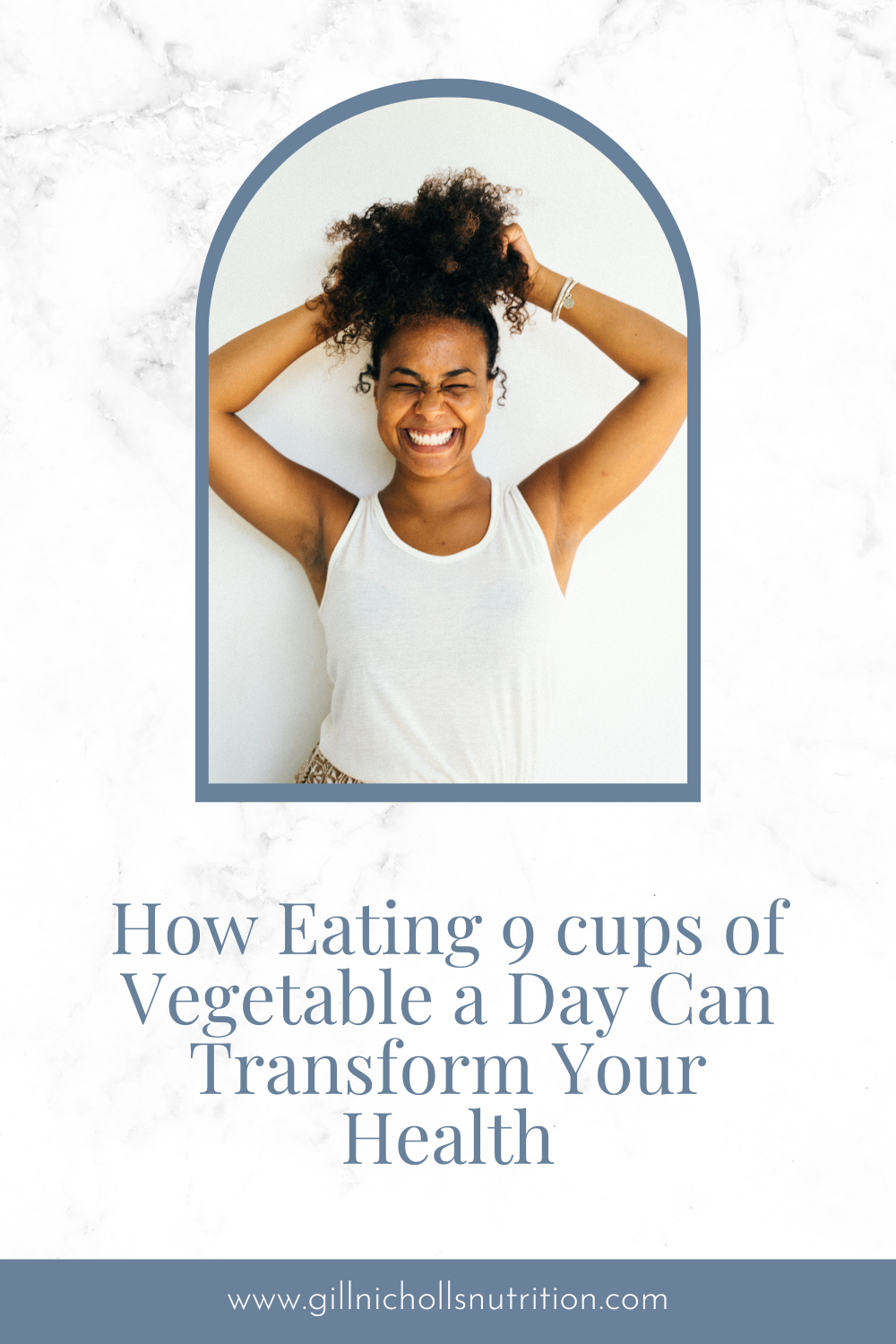How eating 9 cups of vegetable a day can transform your health.
Are you getting your daily dose of vegetables?
According to the American Gut Project, the average American only eats about 1.5 servings of fruits and vegetables per day. But did you know that experts recommend at least 9 cups of vegetables per day or 30 different plant foods per week for optimal health and wellbeing? In this post, we'll explore the benefits of this plant-heavy diet, including its effects on skin health, weight loss, gut health, menopause, and hormones. We'll also share a sample day of eating and some delicious recipes to help you get started.
Benefits of a Plant-Heavy Diet
Skin Health: The antioxidants and nutrients found in vegetables can help protect your skin from damage and keep it looking youthful. Beta-carotene, for example, is found in brightly coloured vegetables like sweet potatoes, carrots, and peppers and is converted to vitamin A in the body, which is essential for skin health. Vitamin C, found in leafy greens and citrus fruits, can also help with collagen production, which can improve skin elasticity and reduce the appearance of wrinkles.
Weight Loss: Vegetables are low in calories but high in volume, which means you can eat a lot of them without consuming too many calories. They're also high in fibre, which can help you feel full and satisfied and prevent overeating. Studies have found that people who eat a plant-heavy diet tend to weigh less than those who don't.
Gut Health: Vegetables contain fibre, which is essential for a healthy gut. Fibre helps feed the good bacteria in your gut, which can improve digestion, reduce inflammation, and boost immunity. A plant-heavy diet has also been shown to reduce the risk of colon cancer and other gut-related diseases.
Menopause: Eating a variety of plant foods can help alleviate symptoms of menopause, such as hot flashes and mood swings. Soy products, for example, contain phytoestrogens that can mimic the effects of estrogen in the body and reduce hot flashes. Leafy greens are also rich in magnesium, which can help reduce anxiety and improve sleep.
Hormones: Vegetables contain nutrients that can help balance hormones, particularly for women. Cruciferous vegetables like broccoli, cauliflower, and cabbage contain compounds that can help metabolize excess estrogen and reduce the risk of breast cancer. Leafy greens are also rich in folate, which is essential for fertility and pregnancy.
Here's a sample day of eating that includes 9 cups of vegetables and 30 different plant foods:
Breakfast: Veggie scramble with spinach, bell peppers, mushrooms, and onions, topped with avocado and salsa. Served with a side of mixed berries and a slice of whole grain toast.
Snack: Carrot sticks with hummus and cucumber slices.
Lunch: Big salad with mixed greens, tomatoes, cucumbers, carrots, beets, bell peppers, and grilled chicken. Served with a side of quinoa and a homemade vinaigrette dressing of olive oil and apple cider vinegar.
Snack: Apple slices with almond butter and a handful of mixed raw nuts.
Dinner: Grilled salmon with roasted asparagus, Brussels sprouts, and sweet potatoes. Served with a side of brown rice.
Recipes
Here are some delicious and easy recipes to help you incorporate more veggies into your diet:
Easy Veggie Scramble
Ingredients:
4 eggs
1 cup baby spinach
1/2 cup sliced mushrooms
1/2 cup diced bell peppers
1/4 cup diced onions
Salt and pepper to taste
1 tbsp olive oil
Salsa and sliced avocado for topping
Instructions:
Heat the olive oil in a non-stick pan over medium heat.
Add the diced onions and bell peppers and cook for 2-3 minutes, until they begin to soften.
Add the sliced mushrooms and cook for another 2-3 minutes.
Add the baby spinach and cook until wilted.
In a separate bowl, beat the eggs with salt and pepper.
Pour the eggs into the skillet and cook until set, stirring occasionally.
Serve the veggie scramble with salsa and sliced avocado on top.
Roasted Vegetables
Ingredients:
1 lb Brussels sprouts, trimmed and halved
1 lb asparagus, trimmed
2 sweet potatoes, peeled and cubed
2 tbsp olive oil
Salt and pepper to taste
Instructions:
Preheat the oven to 400°F.
Toss the Brussels sprouts, asparagus, and sweet potatoes with olive oil, salt, and pepper.
Spread the vegetables in a single layer on a baking sheet.
Roast for 20-25 minutes, or until tender and browned.
Quinoa Salad
Ingredients:
1 cup quinoa, rinsed and drained
2 cups water
1 cucumber, diced
1 red bell pepper, diced
1 carrot, shredded
1/4 cup chopped fresh parsley
1/4 cup chopped fresh mint
2 tbsp olive oil
2 tbsp lemon juice
Salt and pepper to taste
Instructions:
In a medium saucepan, bring the quinoa and water to a boil.
Reduce the heat to low, cover, and simmer for 15-20 minutes, or until the quinoa is cooked and the water is absorbed.
Fluff the quinoa with a fork and let it cool.
In a large bowl, combine the cooked quinoa, cucumber, red bell pepper, carrot, parsley, and mint.
In a small bowl, whisk together the olive oil, lemon juice, salt, and pepper.
Pour the dressing over the quinoa salad and toss to combine.
Eating 9 cups of vegetables per day or 30 different plant foods per week can have numerous health benefits, from improving skin health and gut health to promoting weight loss and hormone balance. By incorporating more vegetables into your diet, you can enjoy a variety of flavours, textures, and nutrients that will keep you feeling healthy and energized.
So go ahead and experiment with different veggies, try new recipes, and see how good you can feel!
Loved this post?
Pin it for later




